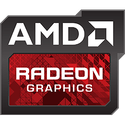Sunday, September 15th 2024

AMD Confirms FidelityFX Super Resolution 4.0 will be AI-powered, Focused on Efficiency
According to Tom's Hardware, AMD has confirmed that its upcoming FidelityFX Super Resolution 4 (FSR 4.0) graphics upscaling solution will harness the power of AI for frame generation and frame interpolation. This update marks a significant shift from the company's previous analytical-based approaches, as revealed by Jack Huynh, AMD's senior vice president and general manager of the Computing and Graphics Business Group. Initially, FSR4's primary focus is addressing the persistent challenge of battery life in handheld gaming devices. Huynh emphasized the need for extended playtime, stating, "I need to play a Wukong for three hours, not 60 minutes." To achieve this, AMD has been working on AI-based upscaling techniques for nearly a year. As a reminder, FSR 1.0 used spatial upscaling, version 2.0 used temporal upscaling, and FSR 3.0 also used temporal upscaling with optional frame generation.
While the initial context for FSR4 centers on handheld devices, AMD's work with developing open-source, architecture-agnostic algorithms suggests broader applications. FSR4 might be compatible with a wide range of GPU solutions, including non-handheld devices, benefiting desktop and laptop users as well. This move to AI-based technology aligns AMD with competitors like Intel, who have implemented similar approaches in their XeSS technology, and NVIDIA with its DLSS solution. Although the release date for FSR4 remains unannounced, its year-long development suggests it may be nearing completion. However, as with previous upscaling solutions, widespread adoption in games may take time following its release.
Sources:
Tom's Hardware, via VideoCardz
While the initial context for FSR4 centers on handheld devices, AMD's work with developing open-source, architecture-agnostic algorithms suggests broader applications. FSR4 might be compatible with a wide range of GPU solutions, including non-handheld devices, benefiting desktop and laptop users as well. This move to AI-based technology aligns AMD with competitors like Intel, who have implemented similar approaches in their XeSS technology, and NVIDIA with its DLSS solution. Although the release date for FSR4 remains unannounced, its year-long development suggests it may be nearing completion. However, as with previous upscaling solutions, widespread adoption in games may take time following its release.

48 Comments on AMD Confirms FidelityFX Super Resolution 4.0 will be AI-powered, Focused on Efficiency
FSR is in a very desperate need of obtaining something special about it. Something that makes it more compelling than DLSS on RTX devices. And no, that special they already included is called, "special needs."
Heck, dont even bother with open sourcing it either.
Do note, I find FSR and DLSS as “excuses” for proper hardware advancement.
About the FSR is trash crowd, i found this video interesting on the subject. And now, i’m not saying the techs are equal, but i dont think is as bad as painted.
You one of those glass half empty type of dudes?I think you will see it before that. RDNA 4 and the PS5 Pro.
When FSR was coming out, things like the GF1600 series were still top video cards and Nvidia left them behind. It is why I wish Nvidia at least continued to improve DLSS 1.0 for a while, but they dropped it like a rock. Now that cards like the GF3000 are the most popular cards, and AMD including NPUs, it only makes sense to pivot to AI upscaling. But again, hopefully they at least have an AI model that can run on any NPU and then a model tailored for their hardware. An agnostic model that can run on Intel, Apple, Nvidia, etc hardware that can have a benefit could be pretty popular. Like if it has 95% the IQ but 120% of the performance as the latest DLSS version at all resolutions and scaling, you'd have a winner right there.
*Current crop of consumers.
Its really sad observing that behavior from consumers these days.